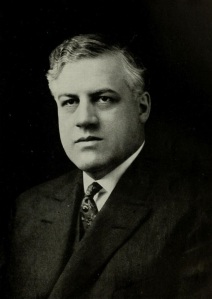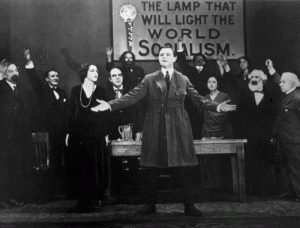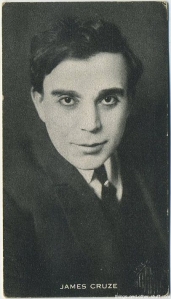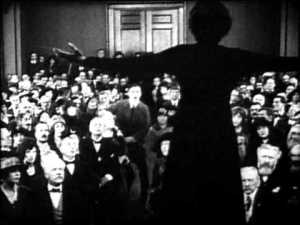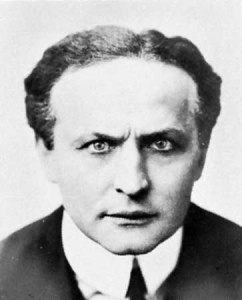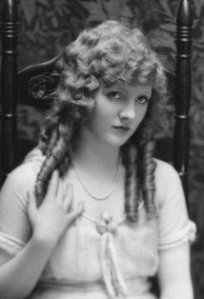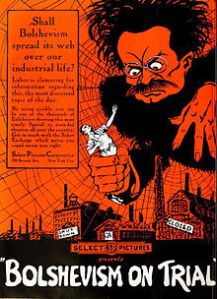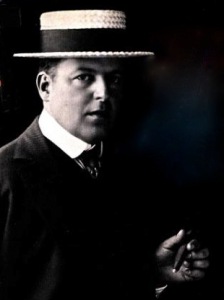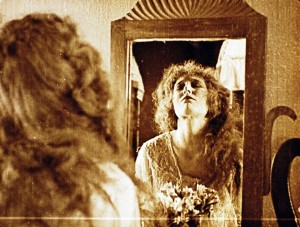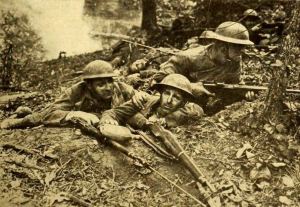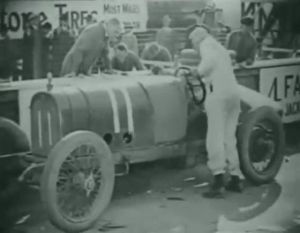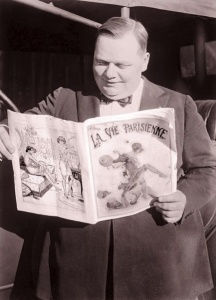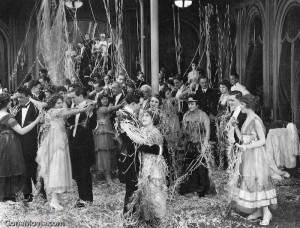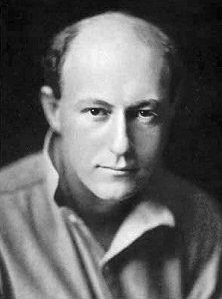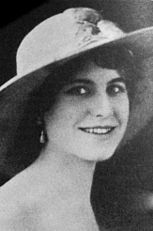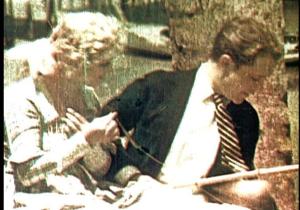In 1919, as the Spanish Flu continued to infect and kill millions, the world tried to recover from World War I. After spending six months at the Paris Peace Conference, President Woodrow Wilson returned to the U.S. and launched an ultimately unsuccessful campaign to bring the United States into the newly formed League of Nations. On September 25th, while barnstorming across the nation in support of the League, a physically exhausted Wilson collapsed and never truly recovered. On October 2nd, a stroke left him partially paralyzed and blind in one eye.
Even before Wilson’s physical collapse, the U.S. population had reason to feel uncertain about the future. On January 6th, the wildly popular Theodore Roosevelt died in his sleep. Before his death, Roosevelt had been widely expected to run for President in 1920 and hopefully return the U.S. to the peace and prosperity that it knew before the Wilson years.
In April, anarchists mailed at least 39 bombs to prominent businessmen and political leaders. On June 2nd, these same anarchists managed to detonate 8 large bombs nearly simultaneously in 8 large cities. If the bombers were hoping that their actions would lead to a revolution similar to the one that had recently occurred in Russia, they were soon proven incorrect. Instead, Attorney General A. Mitchell Palmer , who was himself hoping to win the Presidency in 1920, launched a series of so-called Palmer Raids, targeting anyone who might be considered a subversive.
The anarchist bombings also led to one of the greatest upsets in Academy history. When the Academy Award nominations were announced in January of 1920, most observers felt that the race was between Universal‘s Blind Husbands, United Artist‘s Broken Blossoms, and the Paramount action-comedy The Roaring Road, all of which received 7 nominations. Blind Husbands and Broken Blossoms were both prestige pictures and The Roaring Road was one of the most popular films of the year. As well, Broken Blossoms was directed by D.W. Griffith and many felt that it was finally time for a Griffith film to win best picture.
Instead, when the Fatty Arbuckle-hosted awards ceremony was held on February 20th, 1920 at the Hollywood Hotel, the awards for picture, director, and screenplay went to a low-budget film called Bolshevism on Trial. Based on a novel by Thomas Dixon (who also wrote The Clansman, the novel that inspired D.W. Griffith’s Birth of a Nation), Bolshevism on Trial told the story of a misguided and wealthy activists who attempt to start a commune on an island off the Florida coast, just to have power seized by an evil Socialist agitator named Herman. Bolshevism on Trial may not have been as polished as the other nominees but it both tapped into the national mood and confirmed what many Americans believed about Marxism. Bolshevism On Trial was nominated for 4 award and won 3 of them, leaving many to wonder whether D.W. Griffith was forever destined to always be a contender but never a winner.
As for the other awards, the famous magician Harry Houdini won best actor, largely for playing himself in The Grim Game. However, shortly after winning, Houdini abandoned his acting career, saying that he could make more money by concentrating on his stage show. Evelyn Preer made history as the first African-American to be nominated for best actress. (She was nominated for a “race picture”, Oscar Micheaux‘s The Homesteader.) However, the award itself was won by Mary Miles Minter for her lead role in William Desmond Taylor‘s Anne of Green Gables.
The Sixth Annual Academy Awards
(Honoring films released between January 1st and December 31st, 1919. Winners are starred and listed in bold)
Best Picture
Blind Husbands. Produced by Carl Laemmle. Universal.
*Bolshevism on Trial. Produced by Lewis J. Selzinck. Select Pictures.
Broken Blossoms. Produced by D.W. Griffith. United Artists.
The Lost Battalion. Produced by Edward McManus. W.H. Productions.
The Miracle Man. Produced by George Loane Tucker. Paramount.
The Roaring Road. Produced by Jesse L. Lasky. Paramount.
Best Director, Comedy
*James Cruze for The Roading Road. Paramount.
Joseph Henabery for His Majesty, the American. United Artists.
Marshall Neilan for Daddy-Long-Legs. First National.
William Desmond Taylor for Anne of Green Gables. Paramount.
Best Director, Drama
D.W. Griffith for Broken Blossoms. United Artists.
*Harley Knoles for Bolshevism on Trial. Select Pictures.
George Loane Tucker for The Miracle Man. Paramount.
Erich Von Stroheim for Blind Husbands. Universal.
Best Actor
Richard Barthelmess for Broken Blossoms. United Artists.
*Harry Houdini for The Grim Game. Paramount.
Thomas Meighan for The Miracle Man. Paramount.
Wallace Reid for The Roaring Road. Paramount.
Best Actress
Lillian Gish in Broken Blossoms. United Artists.
Louise Glaum in Sahara. Pathe.
*Mary Miles Minter in Anne of Green Gables. Paramount.
Evelyn Preer in The Homesteader. Micheaux Film.
Best Writing
Blind Husbands. Erich Von Stroheim. Universal.
*Bolshevism on Trial. Harry Chandlee. Select Pictures.
Broken Blossoms. D.W. Griffith. United Artists.
Sahara. C. Gardner Sullivan. Pathe.
Best Cinematography
Blind Husbands. Ben F. Reynolds. Universal.
Bolshevism on Trial. Philip Hatkin. Select Pictures.
*Broken Blossoms. G.W. Bitzer. United Artists.
The Roaring Road. Frank Urson. Paramount.
Best Art Direction
The Avalanche. George Fitzmaurice. Paramount.
*Blind Husbands. Richard Day. Universal.
Male and Female. Wilfred Buckland. Paramount.
The Roaring Road. Wilfred Buckland. Paramount.
Best Engineering Effects
Blind Husbands. Erich Von Stroheim. Universal.
The Grim Game. Harry Houdini. Paramount.
*The Lost Battalion. Burton L. King. W.H. Productions.
The Roaring Road. Frank Urson. Paramount.
Best Title Writing
Blind Husbands. Lillian Ducey. Universal.
Broken Blossoms. D.W. Griffith. United Artists.
Male and Female. Jeanie MacPherson. Paramount.
*The Roaring Road. Marion Fairfax. Paramount.
Films By Number of Nominations:
7 Nominations — Blind Husbands, Broken Blossoms, The Roaring Road
4 Nominations — Bolshevism on Trial
3 Nominations — The Miracle Man
2 Nominations — Anne of Green Gables, The Grim Game, The Lost Battalion, Male and Female, Sahara
1 Nominations — The Avalanche, Daddy-Long-Legs, His Majesty, the American, The Homesteader
Films By Number of Awards
3 Awards — Bolshevism on Trial
2 Awards — The Roaring Road
1 Award — Anne of Green Gables, Blind Husbands, Broken Blossoms, The Grim Game, The Lost Battalion
Studios By Number of Nominations
17 Nominations — Paramount
8 Nominations — United Artists
7 Nominations — Universal
4 Nominations — Select Films
2 Nominations — Pathe, W.H. Productions
1 Nomination — First National, Micheaux Film
Studios By Number of Awards
4 Awards — Paramount
3 Awards — Select
1 Award — United Artists, Universal, W.H. Productions
Trivia:
Evelyn Preer is the first African-American to be nominated for best actress, as well as being the first African-American to be nominated overall.
